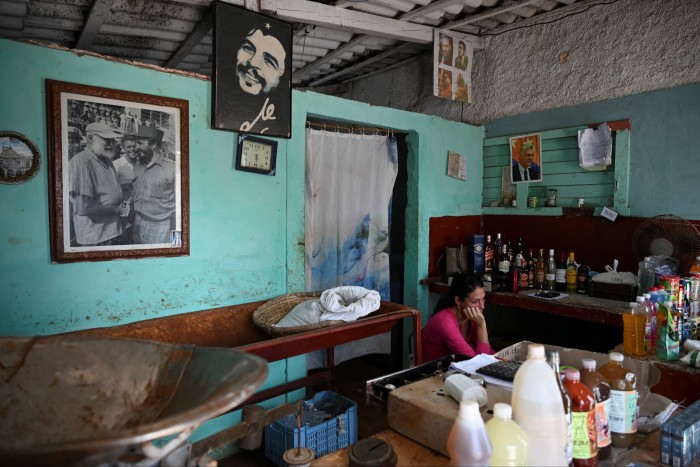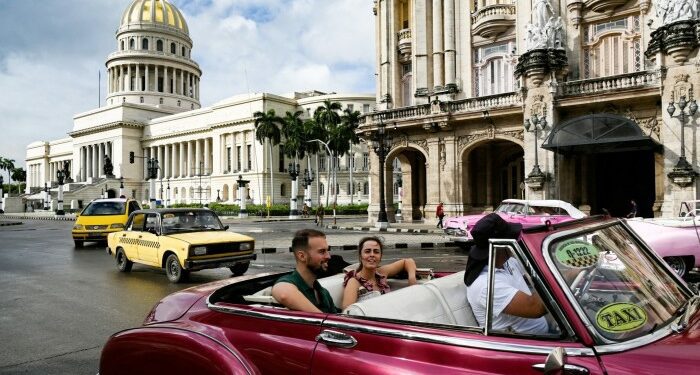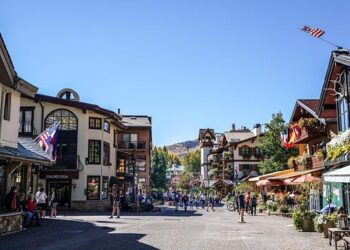Cuba’s faltering tourism sector is likely to face greater threats © Yamil Lage/AFP/Getty Images
A broader wave of sanctions brought further pain for the tourism industry, much of which is controlled by the Cuban military holding company GAESA. Trump’s activation of part of a 1996 law on Cuba enabled Americans to sue foreign firms for using property they had owned before it was nationalised by the Cuban government in the 1960s.
This riskier legal environment scotched hundreds of millions of dollars in foreign investment that had been slated for tourist infrastructure, said people familiar with the situation, and allowed Cuban-Americans to sue Florida-based cruise lines for more than $400mn for having used docks in Havana. That case was finally dismissed by a US appeals court last month.
In 2022, under the Biden administration, visa-free travel to the US was rescinded for people from dozens of countries, including every country in the EU, who had visited Cuba.
“At least 40 per cent of the tourists that get in touch with me decide not to come after they discover that they can’t travel to the US on the visa waiver programme if they come to Cuba,” said Lucy Davies, director of Cubania Travel.
American and European tour operators said the cascade of sanctions had snarled up businesses. One, who asked to remain anonymous, said the Treasury Department had seized more than $200,000 in payments they were sent for tourist services following one of Trump’s new measures in 2019. Another has had multiple accounts with European banks and fintech groups frozen since 2020, and said that since their main business account was frozen this month, they have struggled to pay staff salaries.
Another tour operator said that in order to get around restrictions on sending money to the island, in effect “all of us have become money launderers”.
 Annual visitor numbers to Cuba have almost halved in six years © Yamil Lage/AFP/Getty Images
Annual visitor numbers to Cuba have almost halved in six years © Yamil Lage/AFP/Getty Images
Visitors are not happy either. A tour guide leader from the US on a brief stay at one of the capital’s newer hotels after a recent hurricane said “there was no water the whole night . . . then the water came on again briefly this morning. But I missed my window to get a shower.”
That was not the only problem: “The locks on doors to rooms don’t work and the air conditioning doesn’t work properly,” he said.
At the same time, other countries in the Caribbean are gaining market share. The Dominican Republic welcomed more than 10mn tourists for the first time last year, four times as many as Cuba. Puerto Rico and Jamaica have also recovered strongly since the pandemic.
Paolo Spadoni, a political economist at Augusta University, said tourism in Cuba had “flourished” until the Covid-19 outbreak, but it was facing “a lost decade”.
“Cuba’s tourism recovery in the post-Covid era is one of the worst in the entire Caribbean region,” he added.
If Cuban-American senator Marco Rubio is confirmed by Congress as the next US secretary of state, the island’s faltering tourism sector is likely to face greater threats. Rubio claims to have “directly designed” the first Trump measures against the island.
“From a business perspective it’s much more lucrative, and much less hassle, to work in other parts of the world — even Mogadishu!” said the director of one European tour company. “It’s only a personal love for Cuba that keeps us bringing visitors to the island.”
Source link : http://www.bing.com/news/apiclick.aspx?ref=FexRss&aid=&tid=67416ff0eeb44b468d3188bfd5379b36&url=https%3A%2F%2Fwww.ft.com%2Fcontent%2F75c830f8-0906-4365-88ba-ba7a7fdf0108&c=389286010863752124&mkt=en-us
Author :
Publish date : 2024-11-22 16:01:00
Copyright for syndicated content belongs to the linked Source.












